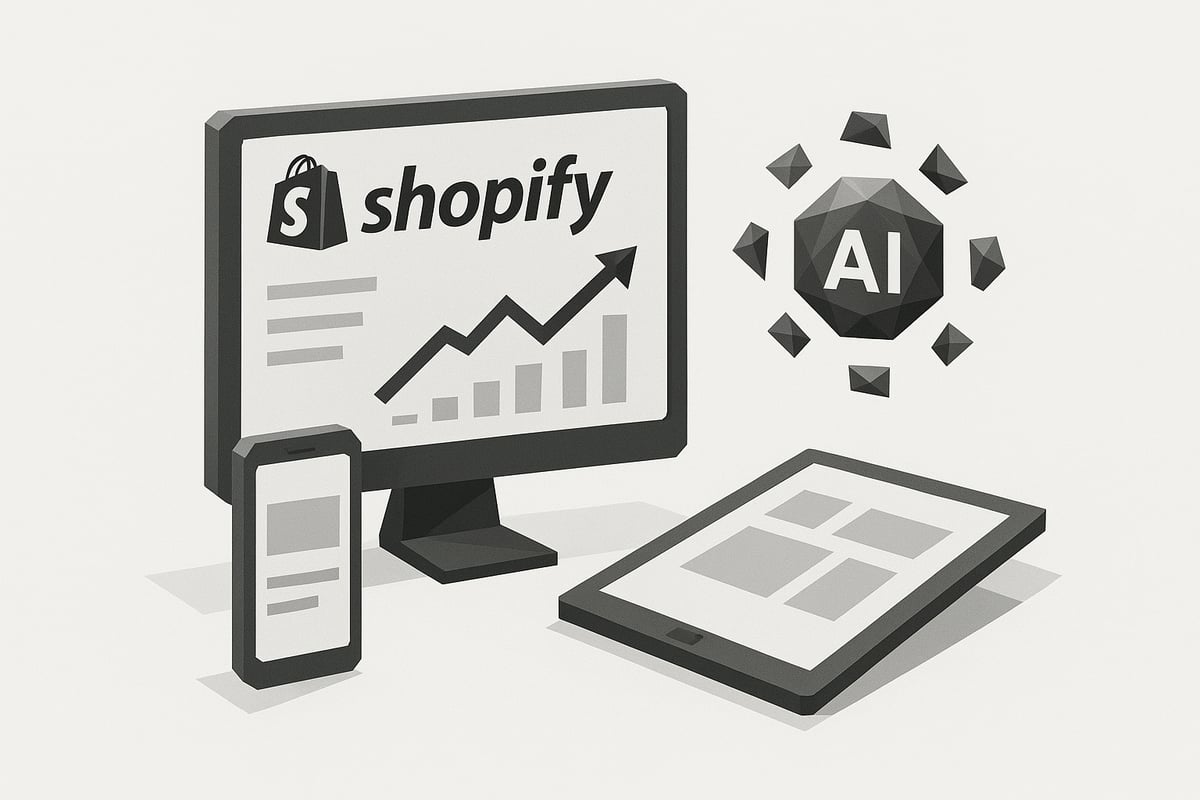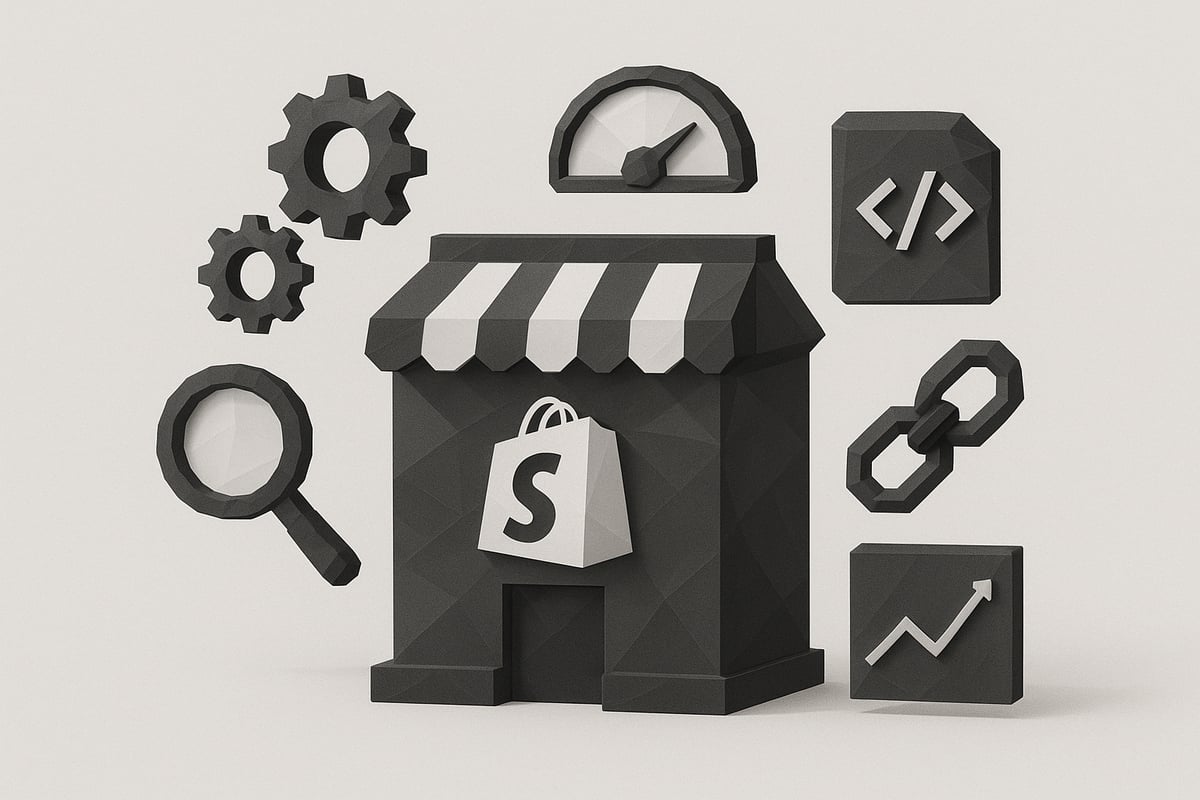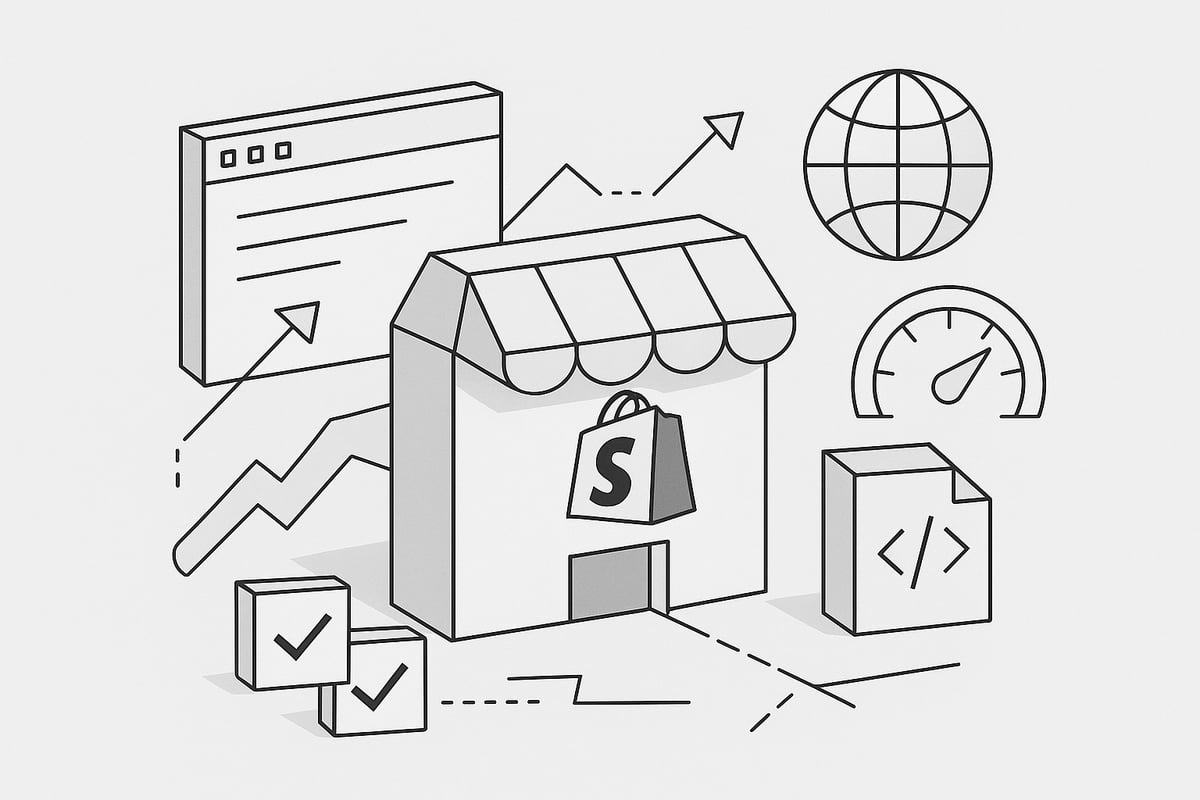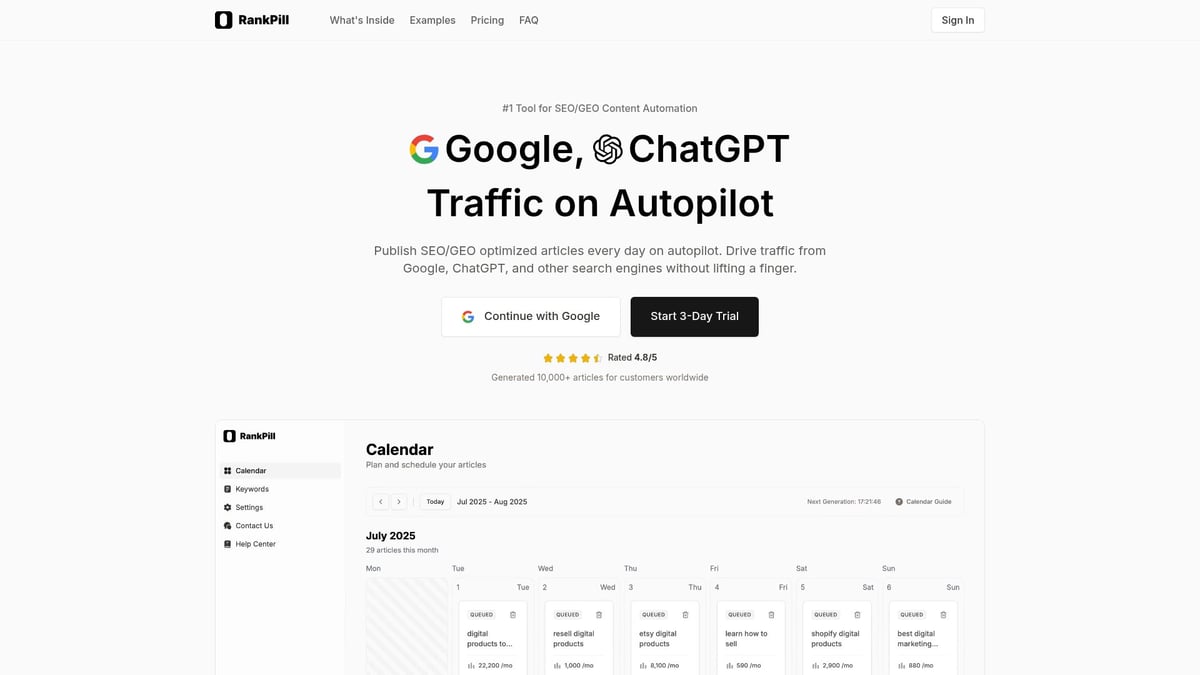In 2025, Shopify store owners face more competition than ever to secure top search engine rankings and stand out in crowded markets.
To achieve meaningful growth, mastering Shopify SEO service is essential for driving visibility and converting traffic into sales. This comprehensive guide equips you with the latest strategies and actionable steps to outperform competitors.
We will explore the newest SEO trends, practical optimization techniques, technical requirements, and proven content and link-building tactics. You will also learn how to select the right Shopify SEO service provider for your business.
Ready to unlock higher rankings and more sales? Follow this step-by-step roadmap and take your Shopify store’s SEO to the next level.
Understanding Shopify SEO in 2025
Staying ahead in the Shopify SEO service landscape requires an understanding of how search engines and user behavior are changing. In 2025, Shopify stores face new challenges and opportunities as algorithms, AI, and user expectations evolve. Let’s break down what matters most for your store’s SEO success.

The Evolving SEO Landscape for Shopify Stores
In 2024 and 2025, Google and Bing have shifted towards AI-driven search. Large language models, like ChatGPT and Google’s AI Overviews, now power a growing share of search results. This means Shopify SEO service strategies must focus on visibility in both traditional and generative search.
E-E-A-T (Experience, Expertise, Authoritativeness, Trustworthiness) is more important than ever. Stores must demonstrate credibility through reviews, expert content, and transparent business information. With mobile-first indexing and Core Web Vitals updates, speed and mobile UX directly influence rankings.
Voice and visual search are expanding rapidly. Shoppers increasingly use voice assistants or upload images to find products. With over 1.7 million Shopify stores worldwide, competition is fierce, and only those leveraging the latest SEO trends will stand out. For a thorough look at how AI is reshaping search, see AI-Powered Search and Generative Engine Optimization.
Key Ranking Factors for Shopify in 2025
For Shopify stores, ranking factors are evolving. Site architecture and speed are critical, impacted by Shopify’s structure and app ecosystem. On-page and off-page signals both matter, but Shopify SEO service experts prioritize structured data and product schema to boost visibility in rich results.
User experience is directly tied to SEO performance. Fast-loading, easy-to-navigate stores retain visitors and reduce bounce rates. Content freshness, such as regularly updated product pages and blogs, signals relevance to search engines.
An example: stores that improved Core Web Vitals often saw significant ranking boosts. Shopify SEO service providers use these insights to maintain a competitive edge for their clients.
Why Shopify SEO Services Matter
DIY SEO for e-commerce can be complex and time-consuming. Shopify SEO service professionals handle technical fixes, content strategy, and link building, freeing up store owners to focus on sales.
A fashion brand working with a top Shopify SEO service agency increased revenue by over $6 million after a targeted SEO overhaul. Given that 68% of online experiences start with search engines, investing in SEO delivers long-term ROI compared to short-term paid ads.
Shopify SEO service providers bring expertise, proven systems, and measurable results that DIY approaches often miss.
Shopify SEO vs. General E-commerce SEO
Shopify offers built-in SEO tools, but also has unique limitations. Unlike WooCommerce or Magento, Shopify’s URL structure and canonicalization can present challenges. The app ecosystem provides SEO plugins, but not all integrate perfectly, making specialized Shopify SEO service knowledge essential.
Platform-specific optimization is crucial. For example, Shopify’s approach to product and collection pages can create duplicate content if not managed correctly. Top Shopify SEO service agencies understand these nuances and tailor strategies accordingly, ensuring your store ranks above competitors.
Step-by-Step Shopify Store SEO Optimization
Optimizing your Shopify store for search in 2025 demands a systematic, data-driven approach. The right shopify seo service will guide you through technical audits, content strategy, and ongoing analytics to achieve higher rankings and sustainable growth.

Step 1: Technical SEO Audit and Setup
Start with a deep technical audit. Make sure your shopify seo service checks crawlability using robots.txt and sitemap.xml. Shopify’s default settings are helpful, but manual review is essential. Duplicate content is common on product and collection pages, so your service should implement canonical tags and review URL parameters.
Speed optimization is vital. Compress images, limit unused apps, and leverage Shopify’s CDN. A mobile-first design is now a baseline, and Core Web Vitals like LCP, FID, and CLS must be monitored. Structured data, especially product schema, enables rich results and better visibility.
A real-world example: After a thorough technical audit, a fashion brand boosted organic traffic by 30%. Tools such as Google Search Console, Screaming Frog, and Shopify’s built-in analytics are fundamental for this phase.
Step 2: Keyword Research and Mapping
Effective keyword research is the backbone of any shopify seo service. Focus on buyer intent and identify high-converting keywords using Shopify analytics and third-party tools. Map keywords to collections, products, and blogs for a structured approach.
Balance short-tail and long-tail keywords. Long-tail terms attract targeted traffic, especially with voice search trends. Perform competitor gap analysis using tools like Ahrefs or SEMrush to find untapped opportunities.
For a detailed process, see Keyword research for blog posts. Remember, 75% of users never scroll past the first page, so targeting under-served queries can make a significant impact.
Step 3: On-Page SEO Optimization
On-page optimization is where your shopify seo service can shine. Start with compelling product titles and meta descriptions that reflect target keywords. Structure your content with clear H1s and H2s for products and collections.
Image SEO matters: write descriptive alt tags, use keyword-rich file names, and compress images for faster loading. Internal linking, such as navigation menus, breadcrumbs, and related products, improves crawlability and UX.
User-generated content, like reviews, boosts trust and ranking potential. Shopify SEO apps such as Yoast and Smart SEO streamline these tasks. Stores have seen higher click-through rates simply by updating meta titles and descriptions.
Step 4: Content Strategy for Shopify
A robust content strategy sets a shopify seo service apart. Launch a blog to build topical authority and attract long-tail traffic. Create buying guides, how-to articles, and product comparisons to answer customer questions.
Integrate visuals and video content for better engagement. Keep your content fresh by updating older posts and product pages, ensuring relevance for 2025. Leverage well-optimized content to win featured snippets and AI Overview placements.
Stores with active blogs receive 55% more visitors. A shopify seo service should help you identify evergreen topics and regularly refresh outdated content for steady growth.
Step 5: Link Building and Off-Page SEO
Backlinks remain a cornerstone ranking factor, so your shopify seo service must prioritize off-page efforts. Earn links from niche-relevant sites, influencers, and through digital PR. Guest posting and strategic partnerships amplify your store’s authority.
Leverage product reviews and user-generated content to attract organic backlinks. For stores with a physical presence, local SEO and citation building are crucial. A Shopify brand featured in major publications can drive both authority and referral traffic.
Industry consensus confirms backlinks are a top 3 ranking factor. Consistent link-building efforts will improve your store’s competitive edge.
Step 6: Tracking, Analytics, and Continuous Improvement
A data-driven shopify seo service will set up Google Analytics and Shopify’s own analytics to track SEO performance. Monitor keyword rankings, organic traffic, and user engagement metrics regularly.
A/B test product pages and new content to identify what resonates best. Use heatmaps and session recordings to uncover UX improvements. Actionable reporting is essential: track KPIs like traffic, conversions, and revenue.
Case studies show that conversion rate optimization can lead to 37% higher sales. Continuous improvement is the hallmark of a successful shopify seo service, ensuring your store adapts swiftly to market and algorithm changes.
Technical SEO Essentials for Shopify Stores
Mastering technical SEO is the foundation for any successful shopify seo service in 2025. A well-optimized Shopify store ensures search engines can crawl, index, and rank your content efficiently. Let’s break down the critical elements every store owner should address.

Optimizing Shopify Theme and Site Architecture
A strong shopify seo service starts with a clean, crawlable site structure. Use Shopify’s menu and collection features to build a logical hierarchy, making it easy for both users and search engines to navigate your store. Keep navigation simple and avoid deep nesting.
Implement canonical tags to prevent duplicate content issues, especially across product and collection pages. Pagination and infinite scroll need careful handling to ensure all products are accessible to search engines. For hands-on guidance, the Shopify integration help guide offers step-by-step instructions for setting up your technical SEO essentials.
Reorganizing collections can significantly improve crawlability and user experience, leading to better rankings.
Speed Optimization and Core Web Vitals
Site speed is a major ranking factor for any shopify seo service. Minimize app bloat by regularly auditing your installed apps and removing those you do not use. Optimize images by compressing files and using formats like WebP for faster loading.
Shopify’s global CDN delivers assets quickly to users worldwide. Focus on improving Core Web Vitals, especially Largest Contentful Paint (LCP), First Input Delay (FID), and Cumulative Layout Shift (CLS).
A store that loads in under two seconds can see conversion rates increase by up to 15 percent, making speed optimization vital for SEO and revenue.
Structured Data and Rich Snippets
Adding structured data is a must-have for any shopify seo service. Implement product, review, and FAQ schema to help search engines understand your content and display rich snippets. This can increase your click-through rates and visibility in search results.
You can use Shopify apps or custom code to add schema markup. Below is an example of JSON-LD for product schema:
{
"@context": "https://schema.org/",
"@type": "Product",
"name": "Sample Product",
"image": ["https://example.com/image.jpg"],
"description": "Product description here",
"offers": {
"@type": "Offer",
"priceCurrency": "USD",
"price": "29.99"
}
}
Stores implementing structured data often see enhanced listings, such as product ratings, in Google search.
Handling International and Multilingual SEO
Expanding globally requires a shopify seo service that supports international and multilingual needs. Shopify’s built-in features allow for multiple languages and currencies, but proper setup is crucial.
Use hreflang tags to signal language and region targeting to search engines. Geo-targeted content and local SEO apps help reach new markets. Always ensure each version of your site is accessible and indexed correctly.
Stores that localize content and implement international SEO best practices often achieve higher rankings and better customer engagement in new regions.
Content Marketing and AI for Shopify SEO
Content marketing is a cornerstone for any successful shopify seo service strategy. In 2025, Shopify stores cannot rely solely on product pages to drive organic growth. Instead, they must establish topical authority and trust through high-quality, relevant content that serves their audience at every stage of the buyer’s journey.
Building Authority with Content Marketing
A robust content strategy is vital for any shopify seo service. Shopify brands are building authority by publishing pillar pages, in-depth buying guides, and resource hubs tailored to their target audience.
- Pillar content addresses broad topics and links to more specific articles.
- Buying guides and how-tos answer common questions, driving both organic search and conversion.
- Customer stories and testimonials add real-world credibility.
For example, one Shopify store increased organic sessions by 261% after launching a dedicated blog and sharing customer experiences. Repurposing this content across social and email channels extends reach and engagement.
Harnessing AI for Shopify SEO Content Creation
AI is transforming how shopify seo service providers deliver results. Modern AI tools can automate keyword research, generate content briefs, and even write product descriptions or blog posts. This allows stores to scale content creation without sacrificing quality.
AI-powered solutions personalize content based on user intent, ensuring relevance for both search engines and customers. As a result, Shopify stores can target high-value keywords and adapt quickly to emerging trends. For more on this, see AI for Shopify SEO content.
Stores leveraging AI are already ranking in Google and AI Overviews, proving that automation and creativity can go hand in hand.
Automate Shopify SEO Content with RankPill
RankPill is a leading platform making shopify seo service automation accessible for all Shopify merchants. It automates keyword research and content creation, publishing SEO-optimized articles, product descriptions, and buying guides directly to your store.

By integrating seamlessly with Shopify, RankPill enables consistent publishing and scalable traffic growth. Merchants benefit from cost savings and increased conversions. One Shopify store reported a significant boost in both organic traffic and sales after implementing RankPill’s automation.
The ability to maintain a steady flow of fresh, optimized content is a game changer for stores looking to compete in 2025.
User-Generated Content and Reviews for SEO
User-generated content is a powerful asset for any shopify seo service. Encouraging customer reviews and Q&A on product pages not only builds trust but also increases keyword-rich content.
- Customer photos and testimonials enhance social proof.
- Moderating and marking up reviews with schema can improve search visibility.
- Stores with robust review sections often rank higher for competitive product keywords.
According to industry data, 93% of consumers say reviews influence their buying decisions. Leveraging this feedback strengthens both SEO and brand reputation.
Content Refresh and Evergreen Strategies
To stay ahead, a shopify seo service must focus on refreshing and maintaining content. Updating old articles and product pages for current trends and keywords ensures ongoing relevance.
- Identify decaying content and revitalize it with new insights or statistics.
- Create evergreen resources like FAQs, product comparisons, and buying guides.
- Regular updates can result in noticeable traffic gains, as seen when stores refresh outdated guides.
A proactive approach to content maintenance keeps your Shopify store competitive, authoritative, and visible in search results.
Choosing the Right Shopify SEO Service Provider
Selecting the right shopify seo service is a pivotal decision for any store aiming for sustainable growth in 2025. The landscape is crowded, and expertise is essential. Prioritize agencies with a proven Shopify portfolio, transparent deliverables, and up-to-date knowledge of platform changes. Seek teams with Shopify Partner status, in-house specialists, and industry certifications.
Look for those who integrate technical SEO with user experience, as highlighted in Technical SEO and User Experience Convergence. A strong shopify seo service should demonstrate measurable improvements in rankings, traffic, and conversions.
What to Look for in a Shopify SEO Agency
When evaluating a shopify seo service, focus on agencies with:
- Documented success stories and Shopify-specific case studies
- Transparent pricing and clear deliverables
- In-house teams with platform expertise
- Shopify Partner status and industry certifications
Coalition Technologies and IT-Geeks, for example, consistently deliver strong results for Shopify stores. Assess their ability to align SEO with business goals, adapt to algorithm updates, and provide ongoing support.
Questions to Ask Before Hiring
Before committing to a shopify seo service, ask:
- What is your process for Shopify SEO audits and strategy?
- How do you handle technical and content optimization?
- What reporting and analytics will I receive?
- Can you share recent Shopify SEO success stories?
These questions reveal the agency’s transparency, workflow, and depth of Shopify knowledge. A reputable shopify seo service will answer confidently and back claims with data.
Comparing Top Shopify SEO Service Providers
Compare leading shopify seo service providers using a structured approach:
| Provider | Services Offered | Price Range | Average Rating |
|---|---|---|---|
| Coalition Technologies | Audits, content, link building | $1,000–$2,500+ | 4.9 |
| Parkhya Solutions | Full-service SEO, CRO | $500–$1,500 | 4.8 |
| Lantern Sol | Technical, on-page, outreach | $100–$1,000 | 5.0 |
Review client feedback and case studies to identify who best aligns with your needs.
In-House vs. Outsourced Shopify SEO
Consider the pros and cons of managing SEO internally versus partnering with a shopify seo service:
- In-house: Direct control, but may lack specialized skills or bandwidth.
- Agency: Access to broader expertise and resources, but requires communication and trust.
- Hybrid: Internal oversight with agency support for specialized tasks.
Stores often start in-house, then scale by adding a shopify seo service as growth demands.
Red Flags and Common Pitfalls
Avoid shopify seo service providers that:
- Promise guaranteed rankings
- Lack transparency in deliverables or reporting
- Use black hat tactics, risking Google penalties
Stores penalized for spammy links or duplicate content serve as cautionary tales. Always prioritize ethical, data-driven partners for long-term success.
Future-Proofing Your Shopify Store SEO Strategy
Staying ahead in e-commerce means preparing your shopify seo service strategy for rapid changes in technology and consumer behavior. The future belongs to stores that adapt quickly, leverage new channels, and measure what matters. Here is how to ensure your Shopify store’s SEO remains effective in 2025 and beyond.
Adapting to AI and Search Engine Changes
AI-driven search is transforming how customers discover Shopify stores. Platforms like Google and Bing are now using large language models and AI overviews, which reward stores with accurate, structured, and user-focused content. To future-proof your shopify seo service, prioritize structured data, up-to-date product schema, and relevant, high-quality content.
Voice search is also on the rise. Adapting your shopify seo service to include conversational keywords and long-tail queries will help capture new audiences. For more insights, see Voice Search and Long-Tail Keywords in SEO. Monitoring algorithm updates and quickly refining your strategy ensures your store stays visible, even after major changes.
Leveraging Omnichannel Marketing for SEO
A modern shopify seo service is not limited to search engines alone. Integrating your SEO efforts with social media, email campaigns, and paid ads amplifies your brand’s reach. Shopify’s built-in sales channel integrations make it easier to repurpose content and keep messaging consistent across platforms.
Cross-channel marketing drives both organic and direct traffic. By synchronizing campaigns and sharing content across multiple channels, your shopify seo service can increase brand awareness and support higher search rankings. This approach helps future-proof your store against changes in any one marketing channel.
Scaling Content and SEO Operations
Growth requires efficient, scalable workflows. Automating repetitive tasks within your shopify seo service, such as content scheduling, technical audits, and link-building outreach, saves time and reduces errors. Platforms and automation tools can streamline these processes, freeing up resources for strategic work.
Invest in team training and upskilling to keep your shopify seo service on the cutting edge. As your store grows, consider building a dedicated SEO team or partnering with an agency for specialized tasks. This allows your store to scale from hundreds to tens of thousands of organic visitors per month, supporting long-term growth.
Measuring Long-Term SEO Success
Tracking the right metrics is crucial for evaluating your shopify seo service. Define KPIs that align with your business goals, such as keyword rankings, organic traffic, conversions, and revenue. Use Google Analytics, Shopify analytics, and attribution modeling to connect SEO performance to sales.
| KPI | Description | Tool |
|---|---|---|
| Keyword Rankings | Track visibility for key terms | Google Search Console |
| Organic Traffic | Measure non-paid visits | Shopify Analytics |
| Conversion Rate | Evaluate sales from SEO | Google Analytics |
| Revenue | Link SEO to bottom-line growth | Shopify Reports |
Regular audits and strategy updates ensure continuous improvement. Year-over-year growth metrics show the true impact of your shopify seo service and help future-proof your store’s success.
Now that you understand the unique challenges and opportunities of optimizing your Shopify store for SEO in 2025, you might be wondering how to put these strategies into action efficiently. With so many moving parts—from technical updates to content creation and keyword research—automation can be a game changer. That’s where RankPill comes in, offering AI-powered tools to simplify your workflow and help you consistently grow your organic traffic. If you’re ready to streamline your Shopify SEO and stay ahead of the competition, you can Get Started and take your store’s visibility to the next level.